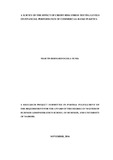| dc.description.abstract | This study examined the effects of credit risk stress testing level on the performance of
banks in Kenya. Financial sector stress test presents information on a system’s possible
losses beneath extraordinary but plausible shocks, helping policymakers evaluate the
significance of the system’s vulnerabilities. The specific objective of the study is to
establish how credit stress testing levels affect the financial performance of commercial
banks in Kenya. Profitability indicator used that is the Return on Assets (ROA) was
used to assess the bank performance. The research was conducted using a Crosssectional
survey with a target population of 42 banks. The sample of the study consisted
of listed commercial banks in the Nairobi Stock Exchange. Data was collected from
secondary sources annual reports and accounts of targeted banks from the period
2013/2014 and 2014/2015. Descriptive, correlation and regression techniques were
used in the data analysis. The study found that there is a relationship between Expected
Loan Loss and Return on Assets at statistically significant (r= .785, p<0.05) at 95%
confidence level. This indicates that if commercial banks in Kenya do not keenly
scrutinize Return on Assets, then the expected Loan Loss might tremendously increase
thus, high chances of credit risk testing. The study found that there was a significant
relationship between credit risk testing levels and Expected Loan Loss -ELL, Exposure
at Default - EAD, Probability of Default-PD, and Loss Given Default- LGD in Kenya
Commercial Banks. As far as credit risk testing is concerned the study recommends that
banks put in a strong policy that increases the loss given default so as only to allow the
clients who are sure of not defaulting in the process repaying the borrowed loan. About
the probability of default, the Kenya Commercial banks should introduce an active
policy that allows them to access all financial and asset accounts of the defaulter to be
able to reduce the probability of the borrower defaulting when he has obtained the loan.
The study further recommends that commercial banks in Kenya should introduce
policies that allow external monitoring and evaluation offices with the help of external
auditors to thoroughly analyze the banks’ exposure at default to curb the menace of
banks closing down due to huge exposure at defaults. | en_US |



